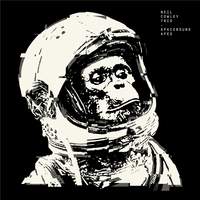Interview,
Neil Cowley on soul music, g oing viral, and his evolving creative journey
In 2024, Neil Cowley remains a prominent figure in the contemporary jazz and neo-classical music world. Best known for leading the BBC Jazz Award-winning Neil Cowley Trio, he shifted away from his origins in 2017 to explore more atmospheric, electronic-driven compositions. His solo work, such as the 2021 album Hall of Mirrors, highlights his ability to mix acoustic piano with ambient electronic soundscapes, earning widespread critical praise in the process.
Earlier this year, Cowley announced the reunion of his trio, and with their new album Entity released just last week, we caught up with the London-born musician to discuss what audiences can expect from the band's much-anticipated live return in November.
It’s been seven years since we last heard from the Neil Cowley Trio. Can you remind us what led to the hiatus, and what encouraged your reunion?
I'd been doing the trio for about 10 years, and I had an appetite to see where I could go next… I needed a break, but coincidentally, I met a new manager, and they came to me with a vision centred around solo piano and the electronic stuff I explored on Spacebound Apes (2016). I rented a studio at Metropolis in Chiswick, filled it with synths, and tried to teach myself a different way of writing. I bought every electronic instrument under the sun! I explored that for three or four years, and brought out a couple of albums… but there was always this nagging feeling that I was trying to replace the humanity the other two guys gave me. It took me six or seven years to realise I was never going to do that — I missed the companionship.
What took you all so long — were there any hitches along the way?
I'd always said we'd get back together… I dropped them a line one day, said I was writing a new trio album, and they were in! I composed from last September to December. We recorded the album in three days and mixed it in the following five. We had very few rehearsals, during which we realised we'd picked up where we left off. I don’t think I’ll ever disband us again! The jazz world is very fluid, and people come and go… but we've always stayed tight. It's the unique character between us. Take one element away, it's not the same.
How would you describe that collective sound we’ve come to know?
Everything is happening at different times but combining to make something nice. The other element is the melody and inner beauty, but underneath, a mechanism working away with a lot of thought, process, practice and musical logic behind it. Ultimately, we want to make something empathetic and memorable for the listener.
And, what do each of you contribute as individuals?

Photo by Tom Barnes
I like to impress the other members. Evan [Jenkins] is all heart, and if he hears a good melody, he'll start bouncing around. Rex [Horan], to quote Douglas Adams, has a brain the size of a planet — his academia and musical logic are amazing. What he finds refreshing is that I throw my compositions at him in dishevelled form… but it comes from a place of feeling, not thought. I hear we get studied in universities, which surprises me because I bailed out of the musical education system at 17! I never went to music college, so it's always a surprise when I hear people are studying our music in those establishments. I suppose that’s a feather in the cap.
Do you have a fear of appearing too intellectual then, in case it erodes your music’s emotional core?
I think I have the right balance because I'm not quite sure what I'm doing! Intellectuality isn't necessarily a threat because I have a peculiar way of approaching composition — it's half-baked but heartfelt. I like the results, and they stand up against other stuff, but they're not necessarily backed by theoretical knowledge.
Could you tell us more about your early musical background?
I have a deep love for Bach and Shostakovich, and you can hear their influence on my compositions, but it's always married with what happened to me when I was 15 when someone suddenly introduced me to American music. I started gigging with this dodgy little soul band that, funnily enough, I still play with today. They introduced me — via the Blues Brothers, which is everyone's classic way of getting into American soul — to Aretha Franklin, Ray Charles and then James Brown. So at the age of 15, I suddenly went, “Ah! Screw this.” What I inadvertently created is a fusion between Soviet-bloc Shostakovich, near-late classical stuff with Western American funk, soul and all that was going on. In the middle, it was the technical ability that Bach gave me, then the impressionism of Debussy and Saint-Saëns.
Who else has had a significant influence on your musical career?
I’m a product of many people's work, dedication and support. All this time, my mum and I were listening to Errol Garner, Fats Waller and Oscar Peterson, because she was a huge jazz fan. So, all these ingredients — It’s a mishmash, and I think that's what you hear. All I'm ever trying to convey is something universal. I try to key into something that feels from deep within that I hope people can relate to. It's a feeling through sound.
I wonder if anyone else was as intrigued as I was then when you released your first solo single, 'Grace', out of the blue in 2016?
It surprised some people! If you listen to the record, you can hear the sound engineer still putting his bags down. It was part of that ‘peaceful piano-wave’, which immediately made me want to never do it again because I felt it had become a cliché. It was just a standalone moment, all about the inner beauty, though sometimes hidden behind the maths.
What was your response to this breakaway success?
I was completely naive about Spotify, but I put that track out, and after a week it had 3,000 streams. I thought, "Oh, that's quite good, might lead to some album sales," and everyone agreed. Then the next day it was at 33,000, then 60,000 and then 90,000. It took me about a week to realise it was on the ‘Peaceful Piano’ playlist with 3 million followers! Our monthly listeners hit close to a million at one point. That’s the thing about Spotify — you get a freak track like that, and it skews the numbers. It’s in a huge number of playlists, saves and liked songs, but only a small percentage go on to discover more of my music. It's just how it is; people don't tend to look further. They might look for another ‘Grace’ and be disappointed.
How has the response been since you shared the news you were reforming?
It's lovely to be welcomed home. When I announced that we were getting back together, it was remarkable. Loads of people said, "Oh, we've been waiting for this." I’m sorry you've all been disappointed with everything I've been doing for the past seven years! Many have been coming out of the woodwork… There's a love for the trio, and that's totally fine by me.
When I watched your recent music videos, I instantly felt that connection you mention.
Certainly, the camaraderie is something a lot of people comment on. It seems to come through the screen; you can feel it in the room. That's why people love seeing us live, because you can see the bond between us. It's a beautiful thing. It's quite odd — Rex is Australian, Evan's a New Zealander and I'm a Pom, as they call me. We're a funny amalgam, but there's so much love.
What would you say is the story behind this album?
What I was trying to do with the solo stuff was emulate what the guys gave me as two human beings… It constrained us; we could cover those sonics and harmonies just between the three of us. Once again, it was just us playing these tunes together in the room. When you listen back, there's elements of what we've done before, but it’s hard to talk about. I hate the word ‘reunion’; we've called it ‘the unpausing of the pause’. I’m not really sure what it is yet!
Are there any new themes you’ve been keen to explore?
A lot of the music is subconscious; the titles and compositions reflect that. It's essentially a celebration of what happens when the three of us get together again. ‘Father Daughter’ is a reference to the deep relationship I have with my daughter, a relationship that doesn’t get spoken about much but is deeply intense — love without condition, without agenda. It was written at a personal moment and played communally with the trio. ‘Adam Alphabet’, the first single, is classic ‘us’ with its slightly wonky elements, syncopated melodies and bounce. There’s joy in playing together again. What you hear on the record is three guys going, “Oh, wow, this is great!”
Finally, how does it feel to know the band is still in the healthy state you left it in?
We were in tears at various stages in the studio... I know it's special for that reason. We sat on the couch listening back at the end of three days, emotionally overwhelmed. There was so much pent-up emotion, and I felt responsible for not playing together. I had moments with my head in my hands, crying; Rex and Evan were in tears too. It was the beauty of being back and how much we missed each other. Essentially, you hear three guys who are so glad to be in the room together and feel so at ease. It truly is heartfelt.
Neil Cowley Trio perform at EartH, Hackney as part of EFG London Jazz Festival on Tuesday 19th November.
In a joyous reunion after a long, 7-year hiatus, the Neil Cowley Trio reconvene giving rise to a creatively inspired recording, 'Entity', their 7th studio album.
Available Format: CD
Including Neil's viral-hit 'Grace'
Available Formats: CD, MP3, FLAC/ALAC/WAV







